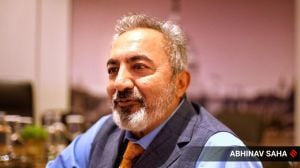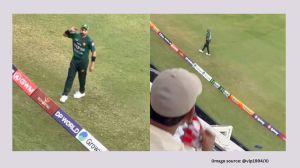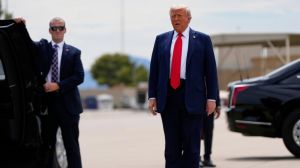We need to be friends, PM tells Washington
WASHINGTON, SEPTEMBER 14: In his address to the United States Congress, Prime Minister Atal Behari Vajpayee called for removing the ``shad...

WASHINGTON, SEPTEMBER 14: In his address to the United States Congress, Prime Minister Atal Behari Vajpayee called for removing the “shadow of hesitation” that lay between New Delhi and Washington and pressed for a deep and lasting partnership between the two countries based on common values and interests.
Shorn of wordy embellishments, it was a push for a strategic alliance between India and the United States that went beyond current geo-politics and addressed issues like freedom and democracy, terrorism and stability, economic progress and the human condition.
Vajpayee also addressed key security issues, presenting India as a stabilising force in Asia and cautioning the United States against the dangers of terrorism emanting from the Indian neighbourhood.
Despite murmurs of disapproval from the Clinton administration that he may have raised the ante with a hardline speech at the Asia Society attacking Pakistan, Vajpayee pressed ahead with another indirect indictment of Islamabad.
“In our neighbourhood,” he told the American lawmakers, “religious war has not just been fashioned into, it has been proclaimed to be an instrument of state policy.”
The reference, transparently, was to Gen Musharraf’s claim that what India called terrorism was actually Jihad. “Distance offers no solution. It should not cause complacence,” Vajpayee cautioned the Congressmen and Senators, detailing India’s suffering because of terrorism. “You know, and I know; such evil cannot succeed. But even in failing it could inflict untold suffering.”
That is why the U.S and India have begun to deepen their cooperation for combating terrorism and these efforts should be redoubled, he said.
The Prime Minister’s 20-minute address was rather prosaic and the delivery was far from vintage Vajpayee. He spoke seated because of his knee problem,the first time a leader — American or foreign — has done so since the wheelchair-bound Franklin Roosevelt.
Vajpayee’s hands shook and his voice quavered as he nervously flipped the opening pages. A warm applause from lawmakers welcoming him was acknowledged with only a hesitant smile.
The Prime Minister also touched briefly on the differences between the two countries, acknowledging that “security issues have cast a shadow on ourrelationship.” He said this was unnecessary and the two sides have much in common and no clash of interests.
“India understands your concerns. We do not wish to unravel your non-proliferation efforts. We wish you to understand our security concerns,” Vajpayee said in a non-committal reference to nuclear issues.
The Prime Minister gave an upbeat picture of where the Indian economy was headed, telling the lawmakers India aimed to double its per capita income in ten years. He also made the mandatory reference to the emerging partnership in information technology between the two countries.
“There was a time when we were on the other side of each other’s globes. Today, on every digital map, India and the United States are neighbours andpartners,” he said.
But it was on the threats faced by India that the Prime Minister was most forceful. He told lawmakers that no country has faced “as ferocious an attack of terrorist violence” as India has over the past two decades.
“There are forces outside our country that believe that they can use the terror to unravel the territorial integrity of India. They wish to show that a multi-religious society cannot exist. They pursue a task in which they are doomed to fail,” he said.
Lawmakers, who were only at half-strength because of campaign compulsions, applauded warmly at the appropriate moments. But following his speech,Vajpayee shambled out stiffly, and there was none of the riotous, touchy-feely scramble that accompanied President Clinton’s address to the Indian parliament.
Photos





- 01
- 02
- 03
- 04
- 05


























